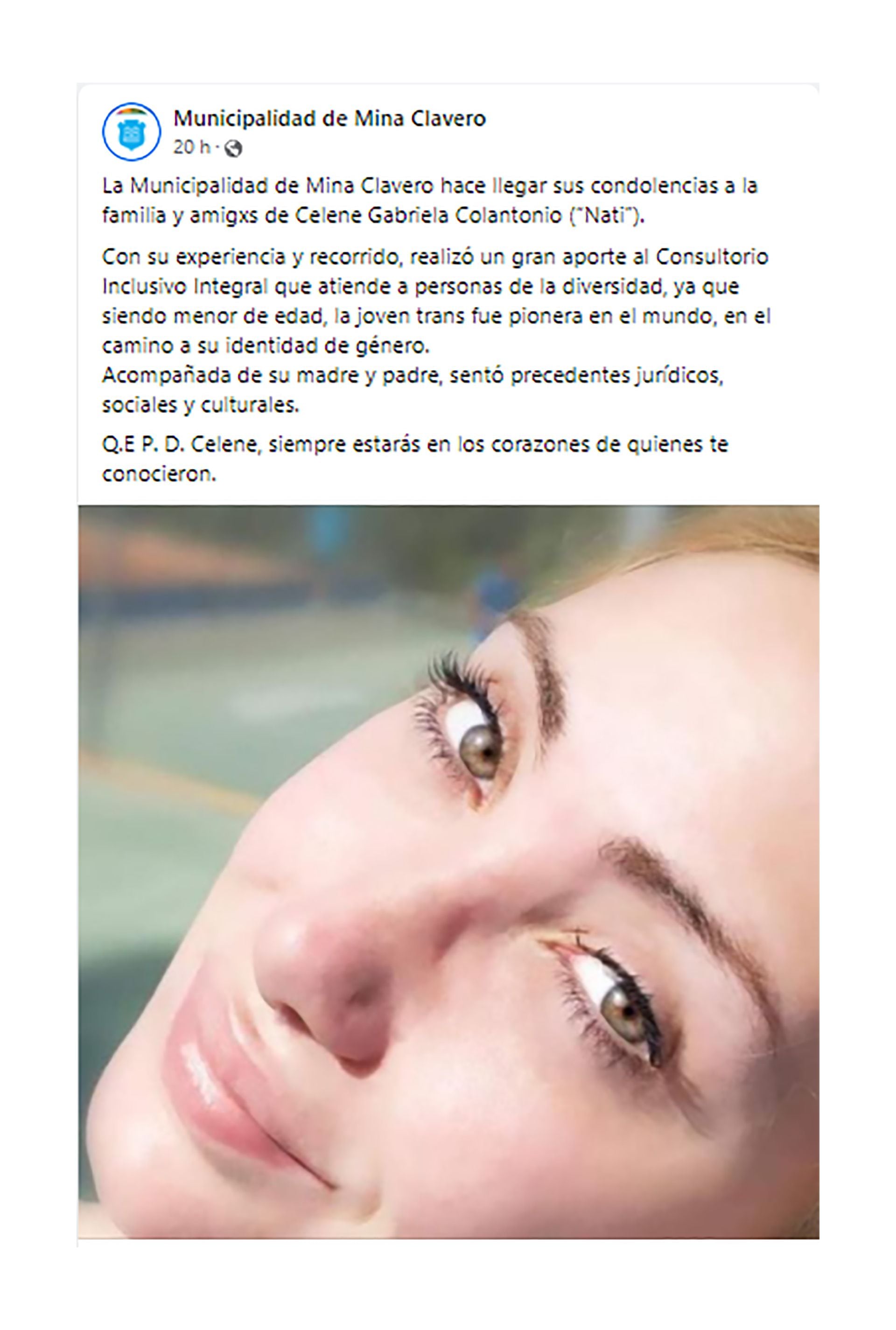
After being found lifeless in her home in Mina Clavero, Celene “Nati” Colantonio's body was transferred to the judicial morgue in Villa Dolores (Córdoba), where she was practiced the corresponding autopsy. Late this afternoon, the results were handed over to the Justice.
What did the report say? According to the first forensic information, “no physical injuries were observed at the autopsy”. “This means that it was not a homicide. That is to say: it was either a natural death or it was a suicide. That is why material was also extracted to carry out a toxicological study,” Infobae close to the case that is being investigated by the Cura Brochero Instruction Prosecutor's Office, led by Analia Gallarato, told Infobae and that, for the time being, continues to be characterized as “doubtful death”.
“Nati” was the first minor to change her gender identity in the province of Córdoba and, at just 14 years old, she became a symbol of the struggle for the right to gender identity in Argentina. Although news of her death broke out today, the 31-year-old was found dead on Monday, March 21 at noon by her stepfather, who immediately informed the local police.
“In the house, where she lived alone, there was no mess. The body did not show any signs of violence either,” a relative to the cause entrusted to this media outlet.

The case of “Nati” had national repercussions in 2005, when the girl was 14 years old. A year earlier she had been diagnosed with gender dysphoria syndrome and she was struggling to carry out the gender adaptation operation. It was her parents who publicly demonstrated in favor of this operation and those who began the legal path for the Justice to end up approving such surgery on a minor. A doctor and a teacher also endorsed the request of the girl's parents.
“It was less difficult to change my body than my mind,” Nati said in an interview. “I remember from those years the courage of my parents, who faced the challenge with me, took care of me and protected me from bullying. It seemed like people were accusing me of something I didn't do. There was a lot of tension,” he said years later.
At that time, the Justice of Villa Dolores rejected treatment of the case. He argued that irreversible surgery, involving the mutilation of a minor, could not be authorized. However, two years later, the High Court of Justice ordered the case to be heard and authorization for surgery was given almost immediately. “I always had my 'I', my identity, but I had to be complete. It was a rebirth,” Nati declared at the time.
The operation was carried out in December 2007 in the city of La Plata, under the leadership of urologist César Fidalgo. After the intervention, Nati Colantonio became the first transgender minor in the history of Cordoba and her case set a judicial, scientific and cultural precedent in that province.

During the following years, Nati lived between Spain and the Cordovan town of Traslasierra, where he studied Fine Arts. Already in 2019, he returned to his hometown of Mina Clavero, where he settled until his death. “I was a bit of a pioneer in this, I had courage, but it was because of me. Today I am happy to know that it worked for everyone who somehow feels different,” said Nati in an interview.
“There are still things to change, there is still a lot of discrimination in Europe and here; it has happened to me that when they 'discover' that I am trans, because I tell it, they start to treat me badly. It's something that makes everything difficult for you,” added the woman who once said that, at the time of surgery, she “went back to the womb” of her mother.
KEEP READING:
Últimas Noticias
Debanhi Escobar: they secured the motel where she was found lifeless in a cistern

The oldest person in the world died at the age of 119

Macabre find in CDMX: they left a body bagged and tied in a taxi
The eagles of America will face Manchester City in a duel of legends. Here are the details

Why is it good to bring dogs out to know the world when they are puppies




